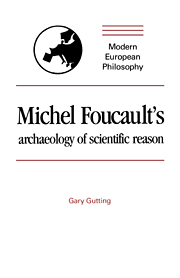Book contents
Summary
The work of Michel Foucault, now so abruptly and arbitrarily completed, can be fruitfully analyzed and evaluated from a wide range of contemporary intellectual standpoints. He can be regarded as a philosopher, a social historian, a literary analyst, a social and political critic; each of these perspectives focuses on something integral to his achievement. But his intellectual métier, through which he develops all his ideas about philosophy, literature, society, and politics, is the history of thought. With one exception, all his major books are histories of aspects of Western thought, and the exception (AK) is a methodological reflection on this historical work. Foucault's choice of title for his chair at the Collège de France was entirely appropriate: Professor of the History of Systems of Thought.
Foucault was not, however, interested in the history of thought merely for its own sake. His historical work was guided by a “philosophical ethos” deriving from the Enlightenment values of human liberation and of autonomous human thought as an instrument of that liberation. Foucault's work is a search for truths that will make us free. But he develops this Enlightenment ideal in an essentially self-critical mode, exhibiting an acute awareness of how specific employments of reasons, even bodies of scientific knowledge, can themselves constrain and oppress human beings. The project of Foucault's history of thought is, accordingly, twofold: to show how particular domains of knowledge have constrained human freedom and to provide the intellectual resources for overcoming these constraints.
- Type
- Chapter
- Information
- Michel Foucault's Archaeology of Scientific ReasonScience and the History of Reason, pp. 1 - 8Publisher: Cambridge University PressPrint publication year: 1989

